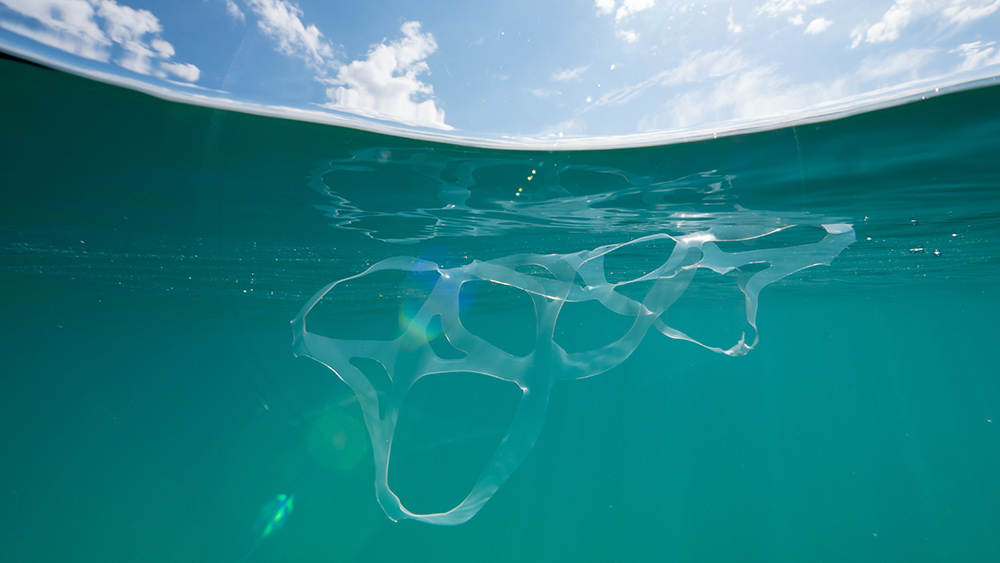 Parler
Parler Gab
Gab
Taiwan produced over 1 billion face masks in three months
Environmental groups estimate that Taiwan produced around 1.3 billion face masks from February to May – that's around 5,500 tons, or 1,100 garbage trucks' worth of waste to collect and dispose of. (Related: Where are the climate warriors in decrying coronavirus mask pollution?) According to the Taiwan Centers for Disease Control, improper discarding of used masks not only poses a threat to the environment but is also a transmission risk. The Department of Environmental Protection has enforced a fine of up to NT$6,000 ($216) for those who dispose of masks improperly.PPE pollution unwelcome element in Philippine tourism
In the Philippines, face masks and other PPE are making an appearance in popular dive sites and threatening tourism. Locals in Bauan, a dive site south of the capital city of Manila, have reported an increase in face masks and PPE shields during the pandemic. They said that tourists who do not dispose of their masks properly impact an environment already littered with plastic bags, diapers and packaging materials. Local authorities said they're aware of the issues and are planning to rollout clean-up drives.COVID-19 waste worsening Thailand's plastic pollution problem
Thai authorities reported an increase in face masks that have been improperly disposed of in the last year. This is a setback to the country's struggle to combat plastic waste. Aside from an increase in face masks and other infectious waste, the report also noted a jump in plastic waste, mainly due to an increase in food delivery orders. The surge in COVID-19 related waste worsens Thailand's plastic pollution crisis. A recent study by Ocean Conservancy lists Thailand as a leading source of land-based plastic waste that leaks into oceans. In fact, over half of the plastics that pollute oceans can be traced to five countries -- China, Indonesia, the Philippines, Vietnam and Thailand. In response, the government urged individuals to do their part in sorting their rubbish.Managing pandemic waste "unsustainable"
In a letter published in Science, environment experts called many waste management practices for dealing with COVID-19 "unsustainable." According to the authors, the surge of COVID-19 waste in cities ill-equipped to deal with it has compromised both infection control measures and recycling efforts. Many cities -- in particular, those in Asia -- experienced a massive increase in medical waste at the height of the pandemic. Wuhan, the epicenter of the pandemic, reported 247 tons of medical waste a day last March -- a 490 percent increase from its daily collection of 50 tons a day. Other cities reported similar increases, with Manila, Kuala Lumpur, Hanoi and Bangkok producing up to 280 tons more medical waste per day than before the pandemic. The authors stressed that safely managing medical and domestic waste is key to containing this looming concern. To prevent COVID-19 waste from straining waste management systems further, they suggested installing mobile treatment systems near hospitals and healthcare systems. They also urged authorities to prioritize sustainable management chains, which will incorporate disaster preparedness and resilience from waste generation to disposal. "Mismanagement can also lead to increased environmental pollution," they wrote. "Safely managing medical and domestic waste is crucial to successfully containing the disease." Learn more about the environmental impact of the Wuhan coronavirus (COVID-19) at Environ.news. Sources include: TaiwanNews.com.tw ChannelNewsAsia.com BangkokPost.com DW.com Science.ScienceMag.orgDeborah Birx hid covid info from Trump, altered CDC guidelines without approval
By Ethan Huff // Share
Germany’s birth rate improbably falls by 11% in the first quarter of 2022
By Lance D Johnson // Share
By Mary Villareal // Share
Health Ranger Special Report: Protect yourself from vaccine shedders
By finnheartley // Share











